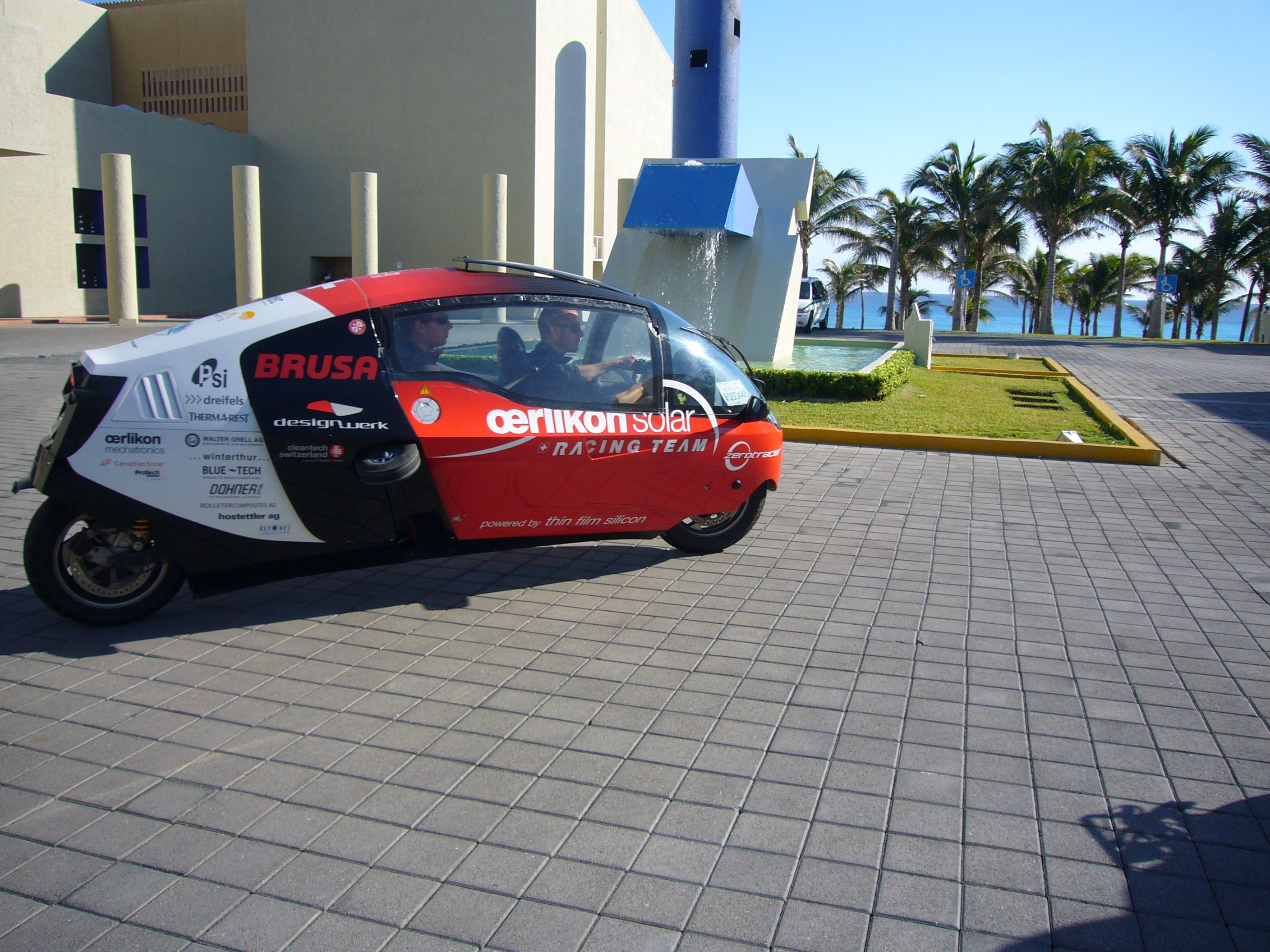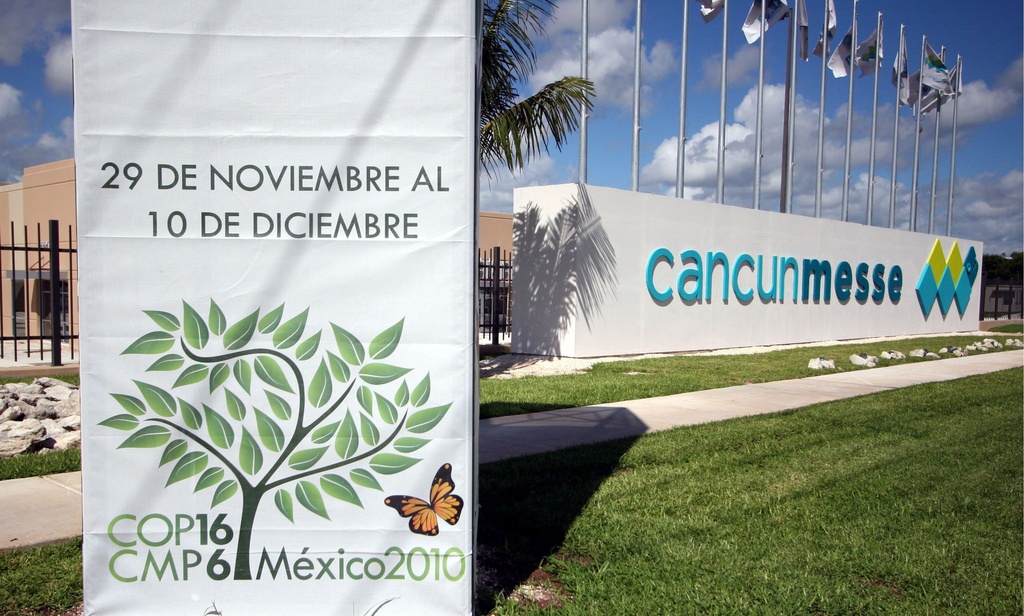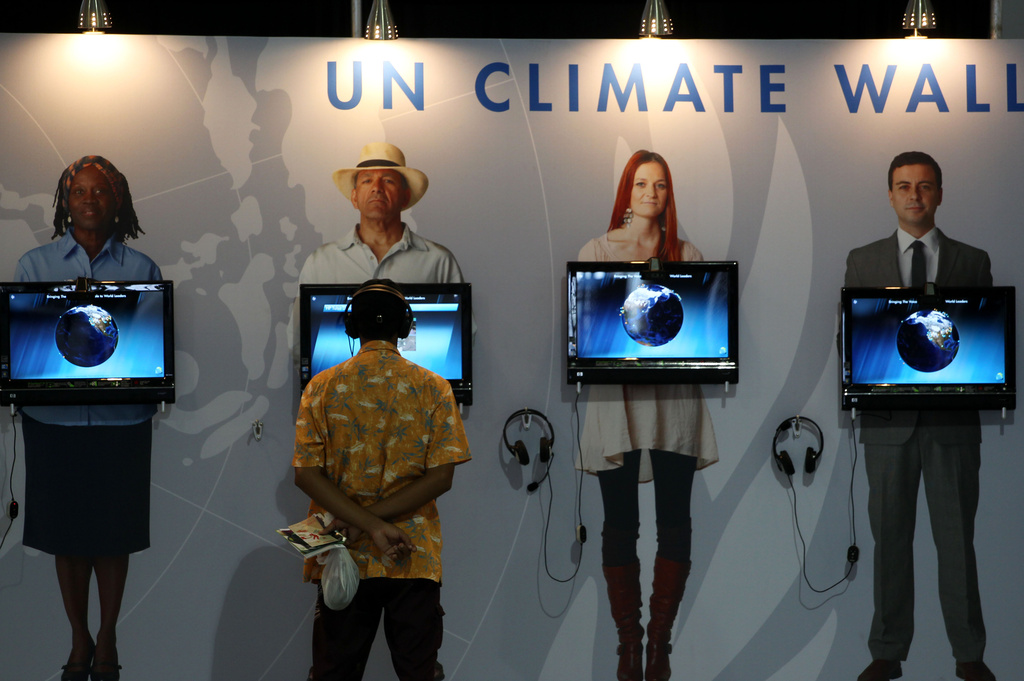Taking the futuristic high-road to Cancun

As far as pit-stops go, the Cancun climate summit has been a must for two Swiss globe-trotting endeavours promoting energy efficiency.
As part of the round-the-world Zero Race, emission-free vehicles rolled up at a beachfront hotel in the Mexican resort on Tuesday – day 71 of a trip crossing four continents using only electric and solar power. In a separate project, a Swiss solar boat is also on show.
The vehicles were escorted to the hotel by a big league cheerleader, the United Nations Environment Programme (UNEP). Its head of communications Satinder Bindra called it a “momentous day”.
“It brings a huge message to the negotiating table in Cancun. These pioneers and entrepreneurs have proved that the technology is out there, the solutions are out there. Now what’s needed is the political will to act on these solutions.”
The Swiss race organiser Louis Palmer talked up the bigger picture as he saw it: “This is the future: electric mobility, powered by renewable energies.”
The race vehicles – two cars and a motorbike – attracted interest wherever they went, said Palmer, a mathematics teacher who last year circumnavigated the globe in a solar powered taxi. “Everyone who sees the cars says ‘this is the future’. We explain we can drive up to 250 kilometres on one charge and people are excited about that.”
In bringing the race to Cancun, he also has a message for the summit: “The technologies are here and no matter what they decide, this is the technology of the future. I just wish the delegations could come together and make some decisions to protect our planet.”
“Visible proof”
Meanwhile, north of Cancun at the Marina La Amada, the world’s largest solar-powered boat has also docked, 61 days after setting off across the Atlantic from Monaco. It was going on show in the conference area of the UN climate summit on Wednesday.
The high-tech PlanetSolar boat, which is driven by an electrical engine using only the sun’s energy, cost around €12.5 million (SFr16.6 million) to build and was part funded by the Swiss foreign ministry.
The Swiss project founder, Raphaël Domjan, said the crew were pleased to have arrived “after navigating through strong currents, unfavourable winds and short days in recent weeks”.
For the PlanetSolar crew, bringing the boat to the summit is “visible proof of efficient and forward-looking use of solar technology to improve the climate of the planet”.
Harnessing technology
In praising the Zero Race, UNEP also said there was an urgent need to find a way to reconcile the growth in mobility and cutting CO2 emissions from cars.
Technology for electronic cars needs to be harnessed and incentives given to support clean energy, it says.
The transport sector is responsible for around one quarter of all energy-related CO2 emissions, a figure set to rise to one third by 2050, UNEP says.
It is estimated that in 40 years, the number of vehicles in the world will have tripled, with more than 80 per cent of that growth occurring in developing countries.
Energy efficiency is being much discussed in Cancun. Mexico’s energy ministry holds a high-level panel discussion on Wednesday on “energy efficiency: seizing the opportunity”, with input from World Bank head Robert Zoellick and environment ministers from Spain, Denmark, Australia and South Africa, among others.
Out with the old
In another side-event, the International Energy Agency presented recent research on electricity supplies and told a packed room that an ambitious mix of policies and technologies were needed to cut global CO2 from energy over the next decades.
The agency said it was possible to reverse the growing trend in transport-related CO2 emissions and to reduce fossil fuel use to well below today’s levels by 2050, mainly by shifting to more efficient and advanced technology vehicles such as electric and plug-in hybrid vehicles.
But major developed economies have to take a lead, says the agency.
Its executive director Nobuo Tanaka told swissinfo.ch that each country had homework to do. In China, the world’s biggest emitter, 50 per cent of all vehicle sales need to be electric and plug-in hybrids vehicles by 2050, he argued, to meet the Copenhagen Accord’s proposed two degree Celsius temperature cap by the mid-century.
“Combustion engine vehicles are going to be moved out and all these new technology vehicles are really necessary,” he said, adding that reaching a global deal on CO2 emission reductions was always going to be “very difficult and challenging but Cancun can help by setting certain priorities in action, like low carbon technologies”.
For the next 5-10 years, the cost of electric and plug-in hybrid vehicles will likely be substantially higher than that of similar sized combustion engines.
Dramatic cost reductions for batteries will be needed to commercialise such new technologies.
The International Energy Agency estimates that in the near term batteries are likely to cost around $600 per kilowatt-hour. This means that for a 30kWh vehicle the batteries alone would cost $18,000-24,000 per vehicle. The cost is expected to drop to a target of $300 per kWh in around 2015-2020.
(Source: International Energy Agency)
The UN Climate Change Conference takes place in Cancun, Mexico, from November 29 to December 10.
The negotiating process revolves around sessions of the signatory parties to the UN Framework Convention on Climate Change (UNFCCC), which meet annually to review how the convention is being implemented.
Talks include the issues of adaptation, reducing greenhouse gas emissions, climate finance, and the future of the Kyoto Protocol.

In compliance with the JTI standards
More: SWI swissinfo.ch certified by the Journalism Trust Initiative














You can find an overview of ongoing debates with our journalists here . Please join us!
If you want to start a conversation about a topic raised in this article or want to report factual errors, email us at english@swissinfo.ch.